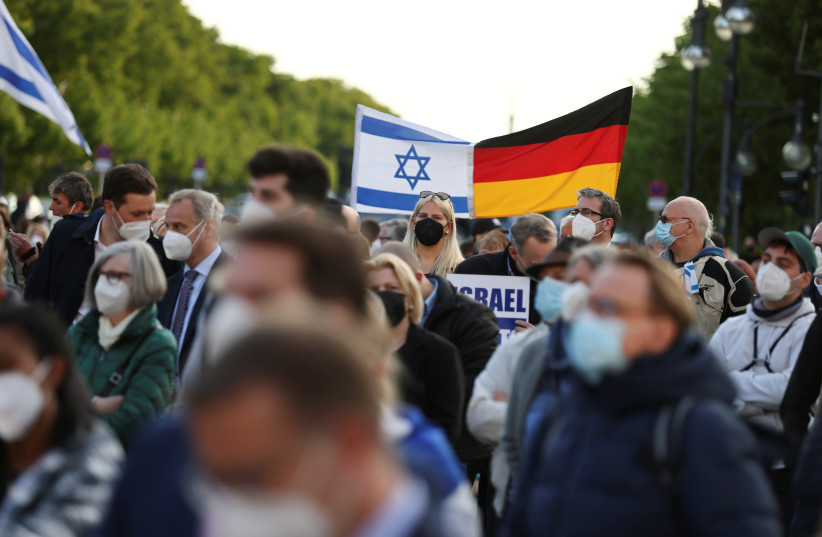The federal German government said in response to a parliamentary question that in the fourth quarter of 2022 it registered 506 antisemitic crimes, including 17 violent acts. The period covered the beginning October, 2022 to January 31, 2023
The new data showed that the authorities are investigating 292 suspects for antisemitic crimes that covered 506 “politically motivated crimes.” Only one person was arrested and “arrest warrants were not issued” for the other suspects.
The Left Party—a far leftist organization in the Bundestag—that submitted the parliamentary query also asked about injuries and deaths in connection to antisemitic crimes. The German government said that four persons were injured in Berlin, two in Nordrhein-Westfalen and one in Rheinland Pfalz.
In contrast to the fourth quarter data for 2022, the number of antisemitic crimes for roughly the same period in 2021 was 642 antisemitic crimes, including 15 violent acts.
The new report from late 2022 noted that “In response to the antisemitic hate wave in May/June 2021”the federal criminal agency “launched a project to combat the escalation of the Middle East conflict and antisemitism on the Internet” in cooperation with the General Public Prosecutor's Office (Frankfurt/Hessen - Central Office for Combating Internet Crime.

The federal government said “ As part of the project, measures were taken to identify 61 suspects and suggestions for deletion of the appropriate content.”
The outbreak
The outbreak of antisemitism that unfolded in Germany in May and June 2021 revolved around Israel's self-defense war against the jihadi terrorist movement Hamas that controls the Palestinian enclave of Gaza. According to a detailed Jewish Institute for National Security of America (JINSA) study by military experts, “Hamas initiated hostilities with indiscriminate rocket fire directed at Jerusalem after the PA [Palestinian Authority ] cancelled elections in the West Bank and amid heightened Palestinian-Israeli tensions in the city. This indicates its strategic goals in the conflict were not related to protecting against any threat to Gaza but tied closely to intra-Palestinian rivalry and the situation in Jerusalem. It even named its operation ‘Sword of Jerusalem.”‘
In June, 2021 a Turkish man identified by German media as Serkan P. sought to to burn down the Ulm synagogue, in the southwestern state of Baden-Württemberg. Firefighters extinguished the blaze. Five days later, Serkan P. fled to Turkey. According to the newspaper Stuttgarter Nachrichten, Baden-Württemberg government's failed to inform the German federal government that Serkan P. had fled the state.
The state of Baden-Württemberg has experienced ballooning antisemitism over the years and the state authorities have reportedly failed to make serious efforts to secure the extradition of Serkan P.
The Free Democratic Party asked the Baden-Württemberg government in a parliamentary question in 2021 whether an international arrest warrant had been filed for Serkan P., Kretschmann’s government declined to answer the question. It appears that the Baden-Württemberg government’s did not notify International Criminal Police Organization, commonly known as Interpol, about Serkan.
The case remains a source of embarrassment for the governor of Baden-Württemberg, Winfried Kretschmann, who provided funds to a BDS Lutheran preacher in the West Bank, and Michael Blume, the commissioner responsible for fighting antisemitism in the state. A German court in Hamburg published a ruling in January that Blume can be called antisemitic because of his verbal attacks targeting German Jews and the Israeli national hero Orde Wingate.
Gerd Buurmann, a German journalist who writes about modern German antisemitism, told The Jerusalem Post “I understand the task of an anti-Semitism commissioner to fight against hatred of Jews. It is his job to keep hate away from Jews. He should therefore never incite hatred of Jews. If he has a problem with certain Jews, it is his duty not to discuss it in public. Michael Blume got into arguments with Jews several times, could not keep this private and thus provided fuel for Jew hatred in public. He must resign or be dismissed.” During Blume’s tenure antisemitic crimes nearly doubled in 2022, according to a German Press Agency report.
